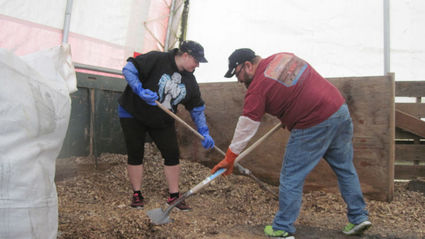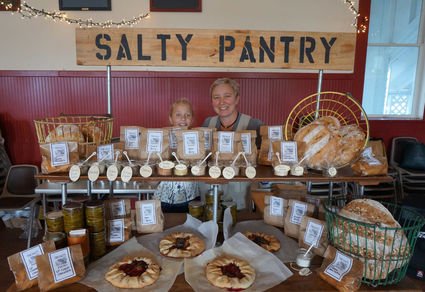Two Petersburg start-ups on the 'Path to Prosperity'

Petersburg Indian Association / Submitted photo
Natocha Lyons and Mark Banda work with a compost pile created by the Petersburg Indian Association utilizing fish waste and wood scraps. PIA's SeaLife Compost was recently chosen as one of 12 semi-finalists in the Path to Prosperity contest, which aims to support sustainable-focused startups in Southeast.
Two Petersburg-based businesses have been chosen as semi-finalist in the annual Path to Prosperity (P2P) contest put on by a partnership between the Haa Aani Community Development Fund, Inc. and The Nature Conservancy.
The annual contest is in its third year and aims to support businesses in Southeast with "innovative sustainability solutions" that will also benefit the local economy and community, according to Paul Hackenmueller, economic coordinator with Haa Aani.
Two winners will be chosen from 12 semi-finalists to receive $40,000 in funds for business and technical services. Though Hackenmueller said, "the program is structured in such a way to benefit all 12 participants."
A large part of that support comes during a weekend-long bootcamp in September where business owners will receive private consulting to develop business and marketing plans and a financial model.
This year's semi-finalists represent a variety of industries, from farms and orchards to B&Bs, coffee roasters and biodiesel producers, and they come from communities across Southeast ranging from Hydaburg to Haines. Locally, two businesses were chosen as semi-finalists this year: The Salty Pantry Market and Deli, conceived of by Mindy Anderson, and Petersburg Indian Association's SeaLife Compost.
Anderson said her love of cooking and community is behind her idea for a new year-round market and deli in Petersburg.
"It'll be a small deli, and it'll have a deli counter with lots of rustic comfort food in it," she said, giving baked chicken, Italian sausage cassoulet and spanakopita as examples of possible offerings in addition to baked goods, soups and salads.
Anderson said offerings would be based on and inspired by what's available locally. "I want to search out as much fresh stuff as I can and other items that people in town make," she said.
Hackenmueller said the emphasis on local food was part of what made the Salty Pantry a contender as a semi-finalist, as well as their goal of creating a community, commercial kitchen space. Anderson said she'd like to have a commercial kitchen available for non-profit groups to use for fundraisers and from which she and others could offer cooking classes for individuals and families.
The final element of the Salty Pantry is a small market that would vend vegetable and meat stocks, pasta, and tofu made in-house as well as some bulk teas, spices and grains that are hard to find other places in town.
"I just want a place that the community can come for the love of food and community," she said.
Cooking has been a passion of Anderson's for years. So far she's channeled that into cooking for family and friends, occasional catering, teaching cooking classes and hosting a food-based radio show. She's also been operating The Salty Pantry as a small business vending salt blends and baked goods at local events for the past year.
Tribal Resource Director Mark Banda is representing PIA's SeaLife Compost business.
"The company would make a very nutrient rich compost all from local resources," Banda said, adding that the main ingredients would be fish waste and wood waste that would otherwise be dumped in local waters or at the landfill.
Hackenmueller said the company's emphasis on reducing fish waste, as well the possible boost to local food production through providing compost, were two elements that stood out on SeaLife's application.
Banda said that PIA has been working with the compost idea for several years. They manufactured a compost tea in the past and have been perfecting their formula for this iteration of the project. Though other tribes have been creating compost from food waste or biomass, he said PIA's formulation is unique in Southeast.
"We have a really good product now and we're ready to take it to the next level," he said. Once off the ground, Banda said he hopes the project would create more opportunity for local tribal members.

Chelsea Tremblay / Submitted photo
Mindy Anderson (right) stands with daughter Evelyn in front of the display for The Salty Pantry. Anderson has been selling handcrafted salt blends and baked goods at local events and was recently chosen as a semi-finalist in the Path to Prosperity contest to turn her business into a year-round deli and market.
"The whole goal of this is to create a sustainable business that tribal members can be involved in, putting tribal members to work," he said.
The compost itself would be available locally for purchase as well as marketed online. Banda said PIA will proceed with the business idea even if they aren't chosen as one of the two finalist. He said making it this far in the competition and attending the bootcamp will provide a lot of information and support for developing and implementing a business plan.
Banda and Anderson have already begun working through a task list provided by P2P ahead of a weekend long bootcamp scheduled for September where they will meet the other semi-finalists and have a chance to meet one-on-one with marketing and human resources experts, attorneys, accounts and other business advisors. The bootcamp will set participants on their way in forming a business plan, which will be evaluated starting in December and from which judges will ultimately chose two winners.











Reader Comments(0)